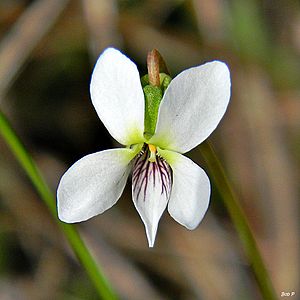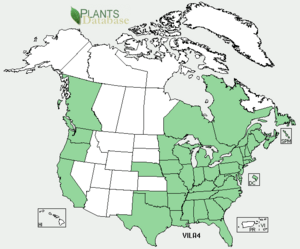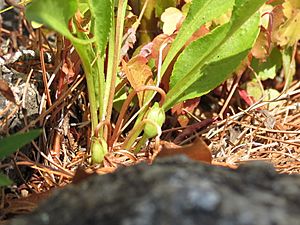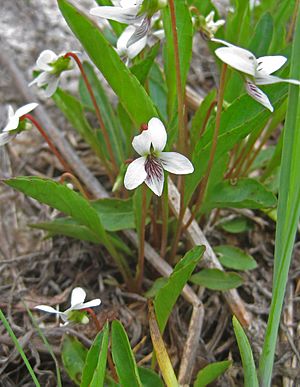Lance-leaved violet facts for kids
Quick facts for kids Lance-leaved violet |
|
|---|---|
 |
|
| Viola lanceolata flower | |
| Scientific classification |
|
| Kingdom: | Plantae |
| Clade: | Tracheophytes |
| Clade: | Angiosperms |
| Clade: | Eudicots |
| Clade: | Rosids |
| Order: | Malpighiales |
| Family: | Violaceae |
| Genus: | Viola |
| Species: |
V. lanceolata
|
| Binomial name | |
| Viola lanceolata |
|
 |
|
| Distribution of Viola lanceolata in North America | |
| Script error: The function "autoWithCaption" does not exist. | |
Script error: No such module "Check for conflicting parameters".
The lance-leaved violet, also called the bog white violet, is a small plant with white flowers. It doesn't have a visible stem. This plant is a type of violet and belongs to the Violaceae family. It got its name because its leaves are shaped like a lance, and it loves to grow in wet places.
Where It Grows
The lance-leaved violet is originally from North America. You can find it growing in many parts of the United States and Canada. It is a native plant in these areas.
Its Favorite Places
This violet loves wet spots! You can often find it in bogs, swamps, and wet meadows. It also grows along the edges of lakes and rivers, especially in sandy soil. The lance-leaved violet is a perennial plant. This means it lives for more than two years and comes back each spring. Its beautiful white flowers usually bloom in May and June.
Sometimes, the lance-leaved violet mixes with another plant called the northern white violet. When they mix, they create a new plant called the primrose-leaved violet. This new plant often grows in similar wet places. Its leaves are a mix between the long, narrow lance shape and the heart shape of other violets.
What It Looks Like
This plant usually grows to be about 10 to 15 centimeters (4 to 6 inches) tall. It has thin, lance-shaped leaves. These leaves might be a bit wider in the summer than in the spring. They usually feel smooth. The plant's stem is also smooth and slender.
The flowers have five white petals. The three bottom petals often have pretty purple lines or veins. This violet spreads by sending out special root-like parts called stolons. These stolons grow along the ground, helping the plant spread to new spots.
Fruits and Seeds
After the flowers, the plant grows small green fruits. These fruits are shaped like an oval and are about a quarter-inch long. Inside, they hold many tiny, round seeds. When the seeds are ready, they turn a dark brown color.
 | Jewel Prestage |
 | Ella Baker |
 | Fannie Lou Hamer |



